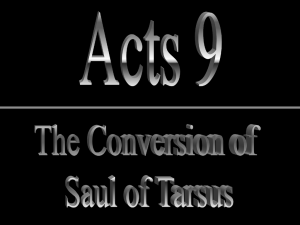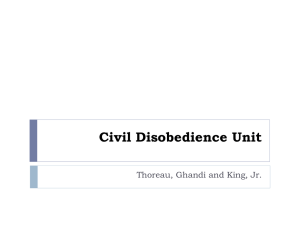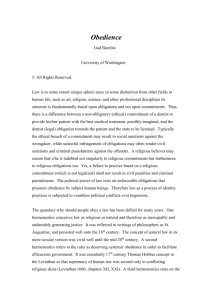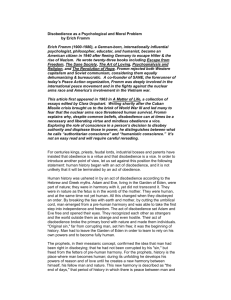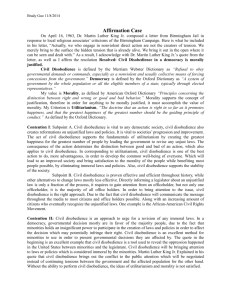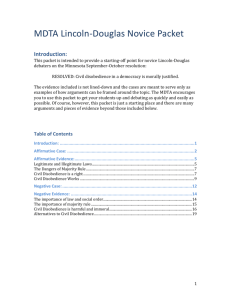Obeying God On Our Own Terms
advertisement
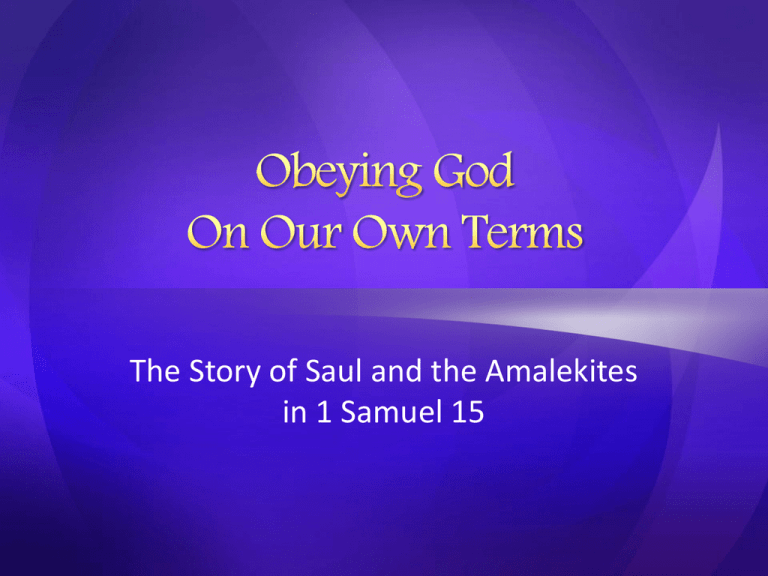
The Story of Saul and the Amalekites in 1 Samuel 15 • God told Saul to utterly destroy the Amelikites (15:1-3; Ex. 17:-16) • Saul believed he had obeyed God (15:13,20) • God said that he had not obeyed (15:10,19,23) • What can we learn from Saul about obeying God on our own terms? Consider seven lessons • Saul obeyed only part of God’s command (15:4-9) – All of God’s commands are important and all parts of each command are important; God gives a command and the terms of the command; all of God’s commands can be understood (Mt. 23:23; 28:19; Eph. 3:4; 5:17) – Today, many pick and choose which of God’s commandments they will obey or which part of a command they will obey: baptism, acts of worship, giving, etc. • Saul believed that he had obeyed God when in fact he had not (15:10-13) – Obedience is accomplished when we hear and do all of God’s word; not when we simply claim to obey (Num. 20:8,11; Mt. 7:21-24) – Today, many claim to be obedient when in fact they are not: baptism, etc. • Saul tried to place the blame for his disobedience on the people (15:14-16) – Passing off the responsibility to others does not absolve us of our disobedience (Ex. 32:22-23) – Today, many disobey God and appeal to others for their justification: church tradition, church survey, “family & friends believe it this way,” “my pastor said,” “that’s what I was told,” etc. • Saul tried to justify his disobedience by saying that it was for worship (15:15) – We disobey even when our disobedience is done in the name of God (Hos. 6:6; Mt. 15:1-9; Mk. 12:33) … true worship obeys God in all things (Jn. 4:24; 14:15,23-24) – Today, many disobey God, but in the name of their religion: “the end justifies the means,” “look at the good it is doing…”, “God would be happy if…”, “we offer contemporary worship,” etc. • Saul was more concerned for the cause of disobedience - the whys - than the fact of his disobedience - the what (15:17-23) – All the “whys” (excuses) we can offer up for our disobedience does not change the fact of our disobedience, rebellion, and stubbornness (Gen. 3:9-19; 1 Sam. 13:8-14) – Today, many continue to offer their “whys” even after their disobedience has been pointed out to them: “Well, I still think…”, “That’s just your opinion,” “But, you don’t understand,” etc. • Saul feared the people and was more interested in pleasing men than pleasing God (15:24-25) – We must not fear men but God, we must obey God not men (Mt. 10:23,34-39; Jn. 12:42-43; Acts 5:28; Gal. 1:10; 1 Thess. 2:6; Jas. 4:4) – Today, many disobey God because they fear someone or something: rejection, commitment, sacrifice personal desires, persecution, etc. • Saul was rejected for his disobedience (15:26-31) – When God says that we have disobeyed there is no changing it; when God makes his final decision about us in the judgment day there is no changing it (Mt. 7:21-23; 25:46) – Today, many do not take seriously the final judgment of God upon them: “My God would never…”, etc. • God demands complete and total obedience • Let us not obey God on our terms … “but first” (Lk. 9:59,61) • Let us wholly obey the Lord in all things and on his terms alone




